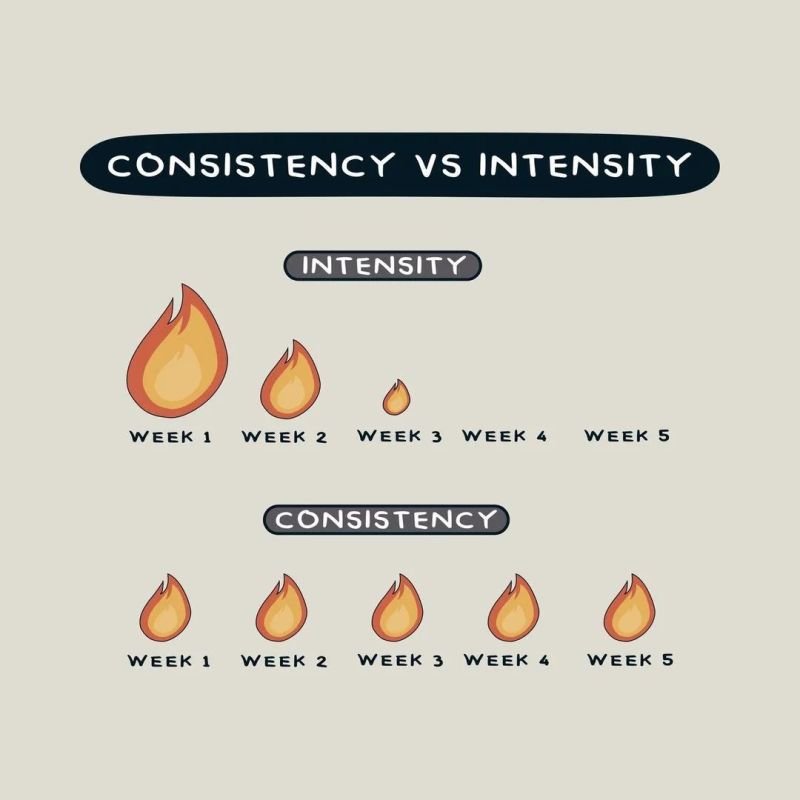Why Consistency is a Cornerstone of Success
Consistency is often said to be one of the cornerstones of a successful business. Regardless of whether you're a solopreneur or managing a large company, maintaining a steady course can dramatically impact your business's growth, reputation, and overall performance.
Here’s why consistency is so vital and how it can transform your business.
Why Consistency Matters
1. It Builds Trust
Consistent actions and messaging create a reliable image of your business but also builds trust with your audience. When customers see you consistently delivering high quality products or services, ‘on brand’ and engaging regularly, they perceive you as credible and reliable. Simon Sinek, author of "Start With Why," says that trust evolves from repeated, dependable interactions that meet expectations, solidifying customer loyalty and creates lasting relationships. This consistency reassures customers, encouraging them to return, knowing they can expect the same quality and service every time. I’d add that in a world where trust is at an all time low, feeling consistency from your favourite brands and services is a real comfort.
"People don’t buy what you do; they buy why you do it." - Simon Sinek
2. It Helps Customers To Recognise Your Brand
Maintaining a consistent brand voice and visual identity is essential for reinforcing your business's character and values. It makes your offerings instantly recognisable to your audience. This consistency in branding ensures that customers recognise what you offer and more importantly perhaps, the deeper reasons behind your actions. By consistently using your logos, colours, and messaging across different platforms, your business establishes a strong presence that stands out in a crowded market, enhancing brand recognition and making it more likely that customers will think of you when they need your products or services. This approach helps to cement your business's reputation in the minds of potential loyal customers.
3. It’s More Efficient
Keeping up a consistent quality sets a standard for what customers can expect from your business, but it also creates a trust that you will provide a predictable and reliable experience for them. This can distinguish your business from your competitors.
Business strategist Amy Porterfield talks about the importance of consistent marketing with regular email communications and content publication. These have been proven to enhance customer engagement and increase conversions.
Illustration by Liz Fosslien
How To Implement Consistency
The beauty of having a business now, is that consistency doesn’t necessarily require constant hands on management. Here’s how you can achieve consistent outcomes without burning out:
1. Use Automation
Automation tools are essential for maintaining consistency, especially in areas like social media posting, email marketing, customer service responses, and order processing. Tools like Hootsuite for social media, or HubSpot for email campaigns, can help you schedule activities that maintain your presence and engagement without daily input. Read more about automation here.
2. Personalise Your Automation
To avoid the impersonal feel that can come with automated systems, it’s advisable to personalise your comms. Use your unique tone of voice and personal touches in automated messages to make them feel more 'you'.
3. Consistent Content Creation
Produce regular content that aligns with your brand’s voice and values. This could be through blogs, podcasts, newsletters, or video content. Consistent content production not only improves SEO but also keeps your audience engaged and informed. This is an area that I often struggle in tbh. It never feels urgent enough, until it is! If you feel the same, you might like to join our monthly social media content creation session. We spend two hours on zoom focusing on what we want to share with our audiences and then we get to work scheduling it. Click here to find out more.
4. Monitor and Adjust
Use analytics to track engagement. Tools like Google Analytics or your platform’s analytics will provide stats on consistent posting times, content types, and how engagement strategies affect your traffic and user engagement. You’ll likely have to adjust your strategies based on what the data tells you so keep an eye on it every month. I used to be distracted by how many people liked a post but if no one is signing up to my course, I need to adjust my approach.
Know what Key Performance Indicators (KPIs) are essential to your business. Everyone has different funnels and strategies so know what’s important for you. They should align with your overall goals. Maybe it’s increasing customer retention, increasing sales, or improving operational efficiency. Each goal should have corresponding KPIs that are measurable. Regularly reviewing and making necessary adjustments keeps you consistent with your business goals.
5. Outsource to Maintain Quality
If you find yourself overwhelmed think about outsourcing certain tasks to a VA. Focusing on what you’re good at and delegating what you don’t need to do will free up your energy to be where you need to be in your business.
“What you do every day matters more than what you do once in a while.”
Seth Godin
Expert Insights on Consistency
Thought leaders in business, like Simon Sinek and Amy Porterfield, have long advocated for the power of consistency. Sinek’s theories on the 'Golden Circle' and 'Start With Why' state the importance of consistent messaging in leadership and marketing. Amy Porterfield’s teachings often focus on consistent systems for content creation and audience engagement as the backbone of successful digital marketing.
In addition to these insights, incorporating ideas from thought leaders like Seth Godin, who advocates for "shipping consistently" as a method of continuous improvement and engagement, can further enhance your strategy.
Consistency shouldn’t be viewed as a constraint or just something else to do, but as a way to really streamline and refine your business practices.
You can’t operate at a higher level without consistency.
It's about making a commitment to a set of standards and practices and using the right tools to maintain them without sacrificing your wellbeing.
It means that your business is always consistent, so you don’t have to be.
